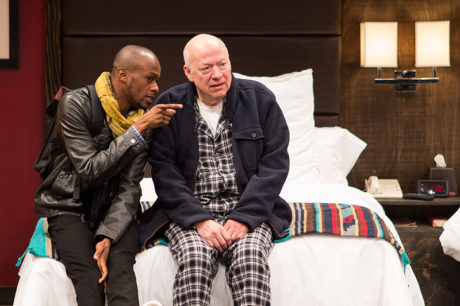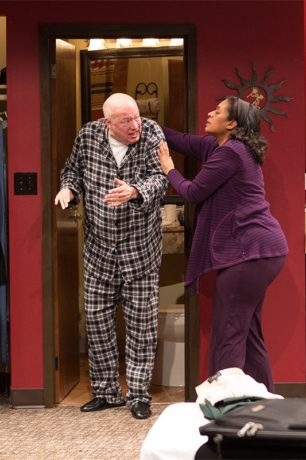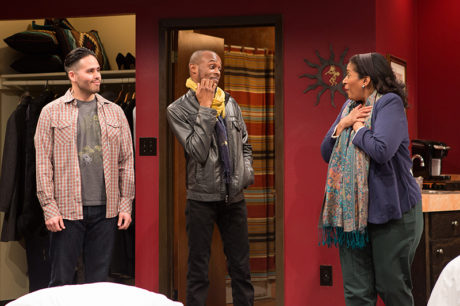Rachel Bonds’ new play, Curve of Departure, now playing at Studio Theatre, is that rarity among modern plays: it’s traditional storytelling at its most engaging.

Enter Rudy, played with a glorious combination of grumpy-old-man and juvenile-trickster by Peter Van Wagner. He’s losing his mind, and control over his bowels.
At curtain, we also meet Linda, played with a fine combination of eternal patience and no-nonsense good sense by Ora Jones. She’s grieving in more ways than one.
With the 50ish African American Linda ironing and the 80ish Jewish Rudy watching stupid TV, one might think this is the odd couple, or a caregiver meets cranky guy sitcom, but it isn’t.

It’s a deeply humanized exploration of what it means to be human in middle-class America. And you’ll feel cleansed as you leave the theatre.
Linda is Rudy’s daughter-in-law, and they have traveled together to this Santa Fe hotel to attend the funeral of Rudy’s son and Linda’s ex-husband, Cyrus. The twist, despite her ex’s less than honorable behavior, is that Linda still has deep affection for Cyrus while Rudy loathes him.
Enter Rudy’s grandson and Linda’s son Felix, played with a head-rubbingly effective anxiety by Justin Weaks. He could just as easily forget that his ne’er-do-well dead father ever existed.
And he would, if not for the presence of his significant other and possible future husband, Jackson, played with an enrapturing empathy by Sebastian Arboleda.
Together, this ensemble of four gives for thoroughly engaging, deeply felt characters controlling life’s most urgent challenge: what are the sacrifices we are willing to make for those we love and care about?
So, yes, Curve of Departure takes on the big themes: life and death. It does so, however, with that most ordinary of events: a funeral. Yes, that’s sad but true.
The power of this production resides in Mike Donahue’s commitment to restraint. Despite the seriousness of the issues the play confronts, Donahue has its characters remain intimate, speaking in undertones of “I love you” and “I’ll miss you.”
Only Rudy raises his voice, and he does so in fits of forgetfulness or bodily dysfunction. And when he does, the other characters hold down the fort of calm.
Additionally, only Rudy wafts poetical, as if in death the mundane force of language loses its sway, allowing the mind to search beyond the meaning of cluck and caw. Rudy’s description of New York City will forever remain emblazoned in my memory.

But such is the force of Curve of Departure: even in death, life burns brightly and lovingly.
In death, we seek those elements of existence not so easily bought and paid for, not so easily captured by the daily grind of everyday life. In death, or at least as we approach its threshold, we remember the sunrise.
In memory, we seek for words to describe it.
Set and Costume Designers Lauren Helpern and Kathleen Geldard give the play its desert reality while Lighting Designer Scott Zielinski provides the sunrise.
Running Time: 85 minutes with no intermission.
Curve of Departure plays through January 7, 2018, at Studio Theatre – 1501 14th Street, NW, in Washington, DC. For tickets call (202) 332-3300, or purchase them online.





